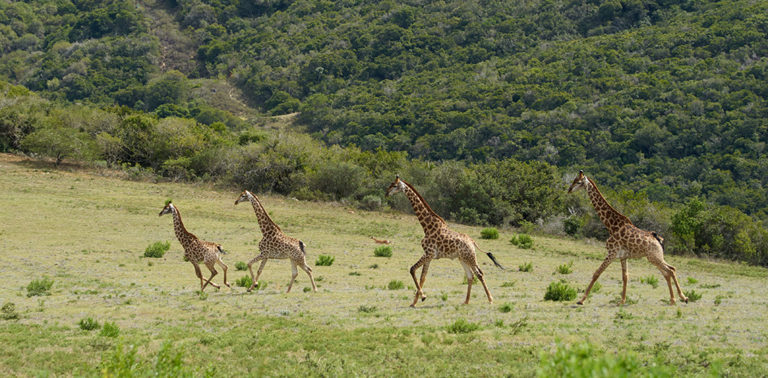On 25 April, the U.S. Fish and Wildlife Service announced that giraffes may qualify for protection under America’s Endangered Species Act.
Giraffe numbers in Africa have dropped by nearly 40 percent in the past 30 years. There are now around 97,000 individuals, which is less than the remaining number of elephants in Africa.

Giraffes running. Image: Wolfgang Hasselmann
According to the Humane Society International, ‘The United States provides a large market for giraffe parts: More than 21,400 bone carvings, 3,000 skin pieces and 3,700 hunting trophies were imported over the past decade. Limiting U.S. import and trade would give giraffes important protections, and an ESA listing would also help provide critical funding for conservation work in Africa.’
The long-necked creatures with fluttery eyelashes are a favourite icon of our continent. According to the International Union for Conservation of Nature (IUCN) giraffes comprise a single species with nine subspecies, namely, the West African, Kordofan, Nubian, reticulated, Maasai, Thornicroft’s, Rothchild’s, Angolan, and South African. The legal petition seeks an endangered listing for the whole species. In 2016, the IUCN upped the threat level to giraffes from ‘least concern’ to ‘vulnerable’ on its Red List of Threatened Species.
‘This is a big step toward protecting giraffes from the growing use of their bones by U.S. gun and knife makers,’ said Tanya Sanerib, international legal director at the Center for Biological Diversity.
The U.S. Fish and Wildlife Service has 12 months to make a final decision on the matter and was prompted by a 2018 lawsuit that was seeking a response to the April 2017 legal petition for Endangered Species Act protection for giraffes brought by the Centre for Biological Diversity, Humane Society International, Humane Society of the United States, and the Natural Resources Defense Council (NRDC).
‘The United States has long been complicit in the trade of giraffe parts, so it’s time for the federal government to stick its neck out for this species,’ said Elly Pepper with NRDC. ‘The United States has taken action to help staunch the trade of numerous species in trouble. Sadly, now it is time to take action to ensure giraffes remain on the planet. They need Endangered Species Act protections and they need them now.’
You may also like
Related Posts
China’s National Health Commission has published a list of controversial coronavirus treatments that have animal...
read more
Warmer sea temperatures in the summer months, especially in February, were recorded and are believed...
read more
While people are stuck indoors due to the coronavirus pandemic, the penguins at the Two...
read more